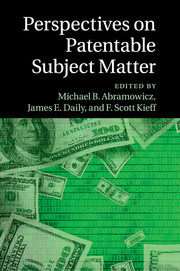Description
Perspectives on Patentable Subject Matter
Coordinators: Abramowicz Michael B., Daily James E., Kieff F. Scott
Perspectives on Patentable Subject Matter brings together leading scholars with diverse perspectives on one of the most pressing issues in patent law.
Language: English
Subject for Perspectives on Patentable Subject Matter:
Perspectives on Patentable Subject Matter
Publication date: 05-2017
Support: Print on demand
Publication date: 05-2017
Support: Print on demand
Perspectives on Patentable Subject Matter
Publication date: 11-2014
431 p. · 15.8x23.5 cm · Hardback
Publication date: 11-2014
431 p. · 15.8x23.5 cm · Hardback
Description
/li>Contents
/li>Biography
/li>
Perspectives on Patentable Subject Matter brings together leading scholars to offer diverse perspectives on the question of which types of subject matter are even eligible for patent protection, setting aside the widely known requirement that a claimed invention avoid the prior art and be adequately disclosed. Some leading commentators and policy-making bodies and individuals envision patentable subject matter to include anything under the sun made by humans, others envision a range of restrictions for particular fields of endeavor, from business methods and computer software to matters involving life, such as DNA and methods for screening or treating disease. Employing approaches that are both theoretically rigorous and grounded in the real world, this book is well suited for practicing lawyers, managers, lawmakers and analysts, as well as academics researching or teaching in law schools, business schools, public policy schools, and in economics and political science departments.
1. 'Clues' for determining whether business and service innovations are unpatentable abstract ideas Pamela Samuelson and Jason Schultz; 2. Still aiming at the wrong target: a case for business-method and software patents from a business perspective Kristen Osenga; 3. Semiotics 101: taking the printed matter doctrine seriously Kevin Emerson Collins; 4. Patent eligibility as a policy lever to regulate the patenting of personalized medicine Christopher M. Holman; 5. The inducement standard of patentability Michael B. Abramowicz and John F. Duffy; 6. Patenting the curve ball: business methods and industry norms Gerard N. Magliocca; 7. Business and financial-method patents, innovation, and policy Bronwyn H. Hall; 8. The litigation of financial innovations Josh Lerner; 9. Patent search and cumulative innovation Michael J. Meurer; 10. The Vonage trilogy: a case study in 'patent bullying' Ted Sichelman; 11. University software ownership and litigation: a first examination Arti K. Rai, John R. Allison and Bhaven N. Sampat; 12. The individual inventor motif in the age of the patent troll Christopher A. Cotropia; 13. Anything under the sun made by humans: patent law doctrines as endogenous institutions for commercializing innovation James E. Daily and F. Scott Kieff.
Michael B. Abramowicz is a professor at George Washington University Law School, Washington DC, where he specializes in law and economics, spanning areas including intellectual property, civil procedure, corporate law, administrative law, and insurance law. His research has been published in the California Law Review, the Columbia Law Review, the Cornell Law Review, the Harvard Law Review, the Michigan Law Review, the New York University Law Review, the Stanford Law Review, the University of Chicago Law Review, the Virginia Law Review, and the Yale Law Journal. He has also published the book Predictocracy: Market Mechanisms for Public and Private Decision Making (2008).
James E. Daily is Postdoctoral Research Associate for, and Administrative Director of, the Hoover Project on Commercializing Innovation. An attorney licensed in Missouri and a patent agent registered with the United States Patent and Trademark Office, his research interests include open source models of innovation, the role of open source in the marketplace, and the interactions between open source and intellectual property. He is also the creator and coauthor of the blog 'Law and the Multiverse' and the co-author of the book The Law of Superheroes (with Ryan M. Davidson, 2012).
F. Scott Kieff is on leave from his post as Fred C. Stevenson Research Professor at George Washington University Law School, Washington DC, having been nominated by President Barack H. Obama, and confirmed by the Senate, to serve as a commissioner of the US International Trade Commission. Before taking up his government post, he was also Ray and Louise Knowles Senior Fellow at Stanford University's Hoover Institution, where he directed the Hoover Project on Commercializing Innovation. He has also regularly served as a testifying and consulting expert, mediator, and arbitrator for law firms, businesses, government agencies, and courts, and on a range of government panels relating to the business and technology sectors.
James E. Daily is Postdoctoral Research Associate for, and Administrative Director of, the Hoover Project on Commercializing Innovation. An attorney licensed in Missouri and a patent agent registered with the United States Patent and Trademark Office, his research interests include open source models of innovation, the role of open source in the marketplace, and the interactions between open source and intellectual property. He is also the creator and coauthor of the blog 'Law and the Multiverse' and the co-author of the book The Law of Superheroes (with Ryan M. Davidson, 2012).
F. Scott Kieff is on leave from his post as Fred C. Stevenson Research Professor at George Washington University Law School, Washington DC, having been nominated by President Barack H. Obama, and confirmed by the Senate, to serve as a commissioner of the US International Trade Commission. Before taking up his government post, he was also Ray and Louise Knowles Senior Fellow at Stanford University's Hoover Institution, where he directed the Hoover Project on Commercializing Innovation. He has also regularly served as a testifying and consulting expert, mediator, and arbitrator for law firms, businesses, government agencies, and courts, and on a range of government panels relating to the business and technology sectors.
© 2024 LAVOISIER S.A.S.




